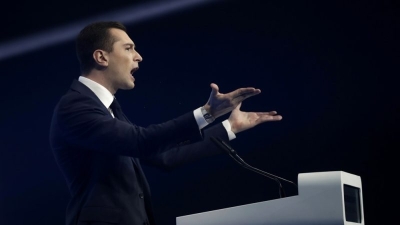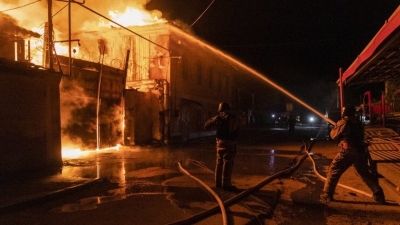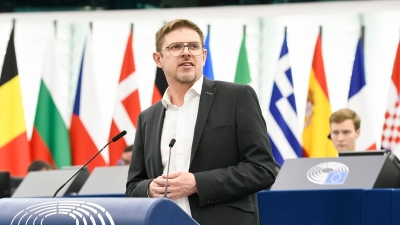Kazakhstan’s commitment to the OSCE and its values adds to the Kazakh-EU relationship
In a recent speech in Vienna to the Organisation for Security and Cooperation in Europe, Kazakhstan’s Deputy Prime Minister and Foreign Minister, Murat Nurtleu, said his country firmly believes that at a time of unprecedented global turmoil and geopolitical shifts, the role of multilateral institutions such as the OCSE, is as crucial as ever. The European Union’s delegation was quick to welcome this commitment to shared values, such as democracy, respect for human rights and for international law. One of the architects of this relationship of mutual respect, was the former Irish Minister for European Affairs, Dick Roche, writes Political Editor Nick Powell.
When Kazakhstan applied to chair the OSCE in 2009 there was considerable pushback, recalls Dick Roche. “There had been tensions between some OSCE member states and Kazakhstan. The United States and the United Kingdom in particular flagged concerns. Both questioned whether Kazakhstan was ‘sufficiently democratic’ to chair the organisation. They were not alone”.
It was suggested at one point that Ireland should compete for the chair but Dick Roche pointed out to a ministerial colleague from another EU member state that in his view -and indeed in the view of the Irish government, if Kazakhstan was good enough to be a member of the OSCE it was good enough to take the chair.
He told me that in addition to the right of Kazakhstan to be treated equitably as a member of the OSCE, his feeling at the time was that Kazakhstan was in a particularly good position to build bridges between the US and its European partners on the one hand and post-Soviet states on the other. Kazakhstan was also in a good position to create and dialogue between the members of the European Union and its Eurasian neighbours.
When Kazakhstan assumed the chairmanship of the OSCE on 1st January 2010, it pledged itself to uphold the fundamental principles and values of the OSCE and dedicated itself to establishing dialogue on security in the wider Eurasian space. “That was a very important contribution and focused discussion on an area that had not previously received the attention it deserved”, he said. “Kazakhstan added a dimension to the dialogue on future European Security architecture”.
“The Astana summit in December 2010, the first full OSCE Summit in 11 years, demonstrated how wrong those who had flagged concerns about Kazakhstan’s capacity had been. The Astana Commemorative Declaration reaffirmed the OSCE’s determination to build security based on trust and transparency – a vision that needs to be reinstated in today’s world”.
Consequently, Dick Roche believes that Kazakhstan is not only a country that from the outset has demonstrated its significance as a member of the OSCE but that now has an especially valuable role to play.“Security in the wider Eurasian space is more important today than it was in 2010 and Kazakhstan could be a key partner for the EU in building that security”.
AdvertisementIn his speech in Vienna, Foreign Minister Nurtleu also referred to Kazakhstan’s proud record as an OSCE member. “Throughout Kazakhstan’s participation in the OSCE, and especially during our 2010 Chairpersonship, we have steadily advocated for constructive dialogue and joint action”, he said. “We firmly believe that amidst unprecedented global turmoil and geopolitical shifts, the role of multilateral institutions is as crucial as ever”.
He pointed out that Kazakhstan is a country “at peace with itself, with all of our neighbours, and with the rest of the world”, adding that his government’s commitment to the diplomatic resolution of disputes through constructive, mutually respectful dialogue is rooted in the historical legacy of his nation. “This is the very foundation of the multi-vector foreign policy that Kazakhstan has pursued since its independence”.
He argued that Kazakhstan’s positive engagement with the world “stems from and is grounded on on-going political, social, and economic modernisation”. This, he added, is demonstrated by the ambitious reform agenda of President Kassym-Jomart Tokayev, an unprecedented democratic process, aimed at building a ‘Just and Fair Kazakhstan’. “Our nation’s democratic path is clear, yet the journey is not complete. My main message today is that democratic changes in my country have become irreversible”.
In response, the EU delegation described Kazakhstan as an important partner for the European Union in Central Asia. “We value our shared commitments to OSCE values, such as democracy, respect for human rights, and international law, and to open and equal dialogue. This includes also the respect for the independence, sovereignty and territorial integrity of all states”.
The EU expressed its appreciation for Kazakhstan’s contributions across all OSCE dimensions, notably in the fields of border management, climate and security, connectivity, labour migration, sustainable economic development, as well as combating radicalisation, terrorism, human trafficking, and money laundering. It also praised the Kazakh government’s commitment to gender equality as a cross-cutting issue.
The EU repeated its support for President Tokayev’s political and economic reforms for the country’s democratic, social, and economic development. “We particularly support efforts to promote the rule of law, respect for human rights and fundamental freedoms, including freedoms of association and of the media”.
“The European Union is committed to deepening and broadening our relations with Kazakhstan in all mutually beneficial areas. We will continue working with Kazakhstan to further advance its reforms towards an inclusive, democratic and fair society”.
Dick Roche told me of his satisfaction that the EU is continuing his vision of Kazakhstan as a valued partner. “The message [in the Foreign Minister’s speech] that ‘Kazakhstan is a country at peace with itself, with all of our neighbours, and with the rest of the world’ is an important one. If all nations great and small could make the same claim the world would be a much better place. Kazakhstan’s commitment to positive engagement with the world is something that the EU should welcome and respond to positively”.
With regard to the political reforms within Kazakhstan, Dick Roche said it is important to recall that this is primarily a matter for Kazakhstan itself. “Europe and the EU should be careful about making judgments until we have achieved perfection ourselves. We are a long way from achieving perfection.
“That is not to say that we should not encourage progress however the extent to which we do so should be respectful and observe the principles of non-interference in internal affairs and respect for national sovereignty. The efforts that Kazakhstan has made to reset its political system and its economy are ambitious.
“The 2022 referendum in Kazakhstan on political reform was particularly noteworthy. Voter turnout was 77% and the thresholds set in the referendum were met. These thresholds required that not only was a 50% + majority in favor of the reforms required but that the majority had to be reflected in at least 12 of the country’s 17 regions. Having led referendum campaigns in Ireland those are high thresholds, that few European countries would set for themselves.
“An interesting aspect of Kazakhstan’s political reform program was the requirement that the country’s president would refrain from being a member of a political party while in office but would, rather, serve as the president for all the people. Even more intriguing is the anti-nepotism reform”.
Dick Roche continues to advocate a deep and respectful EU Kazakhstan relationship, reflecting common values that go well beyond a mutual interest in strengthening trade and transport connections. “Kazakhstan has made it clear that it wants to build a ‘no-strings’ relationship with the EU. It would be foolhardy not to respond positively to that”.
Share this article:



